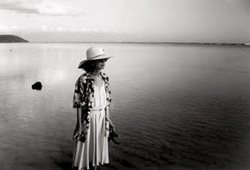 Or rather, your Didion for today. Here is her fictional self in the 1984 novel, Democracy, about a crisis in a powerful political family. There is a murder, an affair, and all the jaded decadence of the 1970s. This being vintage Didion, there's also a great deal of worrying about form: Aerialists know that to look down is to fall. Writers know it too. Look down and that prolonged spell of suspended judgment in which a novel is written snaps, and recovery requires that we practice magic. We keep our attention fixed on the wire, plan long walks, solitary evenings, measured drinks at sundown and careful meals at careful hours. We avoid addressing the thing directly during the less propitious times of day. We straighten our offices, arrange and rearrange certain objects, talismans, props. But Democracy is not just a novel about writing a novel. It's also about Inez Christian Victor, a tired Hawaii-born wife of a liberal politician at the end of the Vietnam War. The kind of woman whose entire existence can be summarized in an arch yet plaintive line from Didion: "In retrospect she seemed to have been most happy in borrowed houses, and at lunch." It's also a novel about writing a novel in Hawaii, something we should all be lucky enough to do. They had met in Honolulu during the winter of 1952. I can define exactly how winter comes to Honolulu: a kona wind comes up and the season changes. Kona means leeward, and this particular wind comes off the leeward side of the island, muddying the reef, littering the beaches with orange peels and prophylactics and bits of Styrofoam cups, knocking blossoms from the plumeria trees and dry fronds from the palms. The sea goes milky. Termites swarm on wooden roofs. The temperature has changed only slightly, but only tourists swim. At the edge of the known world there is only water, water as a definite presence, water as the end to which even the island will eventually come, and a certain restlessness prevails. Mad Men sent Don and Megan to the Royal Hawaiian for the season 6 premiere yesterday. And Don, like Didion, came away from his winter holiday thinking that Hawaii was all about death. "Heaven's a little morbid," he tells the Sheraton guys, in one of the few scenes that wasn't completely boring. "How do you get to heaven? Something terrible has to happen." If only he'd run into Didion, they could've stood together with their cigarettes, enigmatically watching tourists swim.
2 Comments
 My essay on Lynne Sharon Schwartz's lovely new novel Two-Part Inventions (Counterpoint) is online now at the Paris Review Daily. Also discussed: the Bennington MFA, artistic mentorship, and the experience of reading a teacher's books. |
Aboutauthor of The Violet Hour, reader, prodigious eater of ice cream Archives
June 2014
Categories
All
|
 RSS Feed
RSS Feed